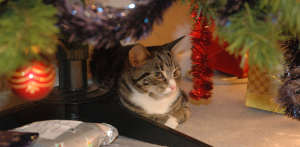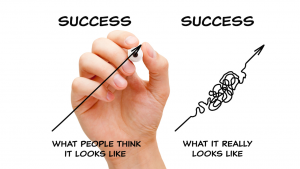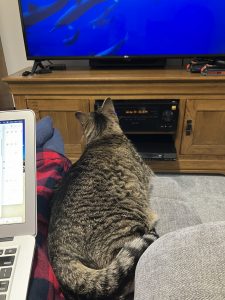Plus an online kerfuffle illustrates why publishers and agents should do more to support debut authors, and young Grabbity under a Christmas tree.
Hi there,
The festive season is truly upon us, which means that there is a four day weekend in the offing for us Brits. I’m taking a couple of weeks off to recharge and recuperate, a break that is sorely needed. At this point in the year, I’m so tired I can barely spell my own name and we really don’t want a repeat of what happened the last time I made that mistake.
If you find yourself at a loose end over Christmas, why not take a look at some of my fiction or essays? You can read my short story, The Lacemaker, or my novella The Gates of Balawat, which are both available in full and for free. And my first self-published novella, Argleton, is currently about halfway through, although there are free ebook downloads for all three if you prefer!
Read this: Best SFF books of the year
I don’t read enough to put together my own list, so I like it when I find one that, top to toe, looks interesting to me. It doesn’t happen very often, but The New York Times’ list of the best fantasy and science fiction of the year includes one of my favourites, Nick Harkaway’s Titanium Noir. Obviously reviewer Amal El-Mohtar’s taste at least slightly overlaps with mine! Pretty much all the books mentioned sound fabulous, so I now have a much longer TBR list for 2024.
Don’t forget that if you’re searching for more good books, take a look at the Word Count Bookshop.org list, which features all the books and authors that I’ve mentioned in this newsletter over the last 10 months.
Read this, two: British indie bookshops blossoming
I loved this piece by Nell Card in The Guardian about six independent British bookshops that are doing well. We hear so much bad news out of the publishing industry that it’s delightful to hear some good news for a change.
What I find interesting is how important it is for a bookshop to find the right niche. The new ones started because the owner had a vision, and the people who took over existing shops reinvigorated their stock list based on serving a very specific community. It’s a good example of how you can thrive if you commit to the ‘passion economy’.
Tip-top tips: Lucy Werner’s book launch blueprint
If you have a book launch coming up, do yourself a favour and read Lucy Werner’s blueprint for ideas on on how to do it. Although Lucy focuses on non-fiction book launches, much of what she suggests would also be useful for fiction.
I particularly like this sage advice, which is relevant for everyone who has ever written anything:
Contrary to popular belief, the success of your book is not based just on the first six months. There is heaps of pressure from everyone to go big and hard in the run-up to your book launch.
Why do we push heavily for the first three months for the marketing department to call that box ticked and move on to the next one?
I find this way of promotion incredibly archaic and stress-inducing.
Pace yourself and go long. I still sell books today, years later, because I’m not burnt out from heavy launches.
Read this, three: Latest online kerfuffle shows how debut writers need more support from their agents and publishers
A debut author, whose book was due to come out next year, has been caught review-bombing other authors whose book launches are also slated for next year. Courtney Maum, after a brief summary of events, has written a very thoughtful piece about how debut authors are let down by the publishing industry, which entirely fails to prepare them for what’s coming.
In most professions in the world—but certainly in America—when you get a job, you are given either an initiation (sometimes called “onboarding”) and/or a code of conduct to sign. An instruction manual to your new job, if you will. […]
Job preparation is a kindness. It’s a kindness to the hire, it’s a kindness to the hire’s colleagues. […]
But when you are an author who gets a book deal, there is no instruction manual. There’s no onboarding document. There’s not a formal initiation period— there’s just a book contract and the assumption (which is a naive one) from your editor and agent that you know what to do now; that you know how to behave.
The publishing industry really does need to do better. Maum has written a book, Before and After The Book Deal, which aims to help early career authors navigate this difficult period, so the information is out there in a digestible form. There’s no reason why agents and publishers couldn’t do a better job of author prep – the could just buy every author a copy of Maum’s book.
Obligatory cat picture
 Christmas Day, 2009. Grabbity and Mewton were just seven months old and experiencing their first festive season. We spent Christmas with my parents, taking the cats with us so that they could stay there whilst we hopped off to Lanzarote for a week around New Year’s. Grabbity took the best spot under the Christmas tree so that she could keep an eye on everything that was going on.
Christmas Day, 2009. Grabbity and Mewton were just seven months old and experiencing their first festive season. We spent Christmas with my parents, taking the cats with us so that they could stay there whilst we hopped off to Lanzarote for a week around New Year’s. Grabbity took the best spot under the Christmas tree so that she could keep an eye on everything that was going on.
I’ll note that since this photo was taken, Grabbity has developed a bit of a passion for eating tinsel. She loves the stuff, and we have seen sparkly poo and vomit on more than one occasion. Now, we use just one or two garlands of tinsel at the very top of the tree where she can’t get at it, and she remains livid about that for the entire time the tree is up.
Honestly, if you can find a life partner who looks at you the way Grabbity looks at tinsel, you’ve got it made.
That’s it for this year! Whatever you are doing over the festive period, I hope you have a restful and enjoyable time.
See you again in 2024!
All the best,
Suw
{ Comments on this entry are closed }






